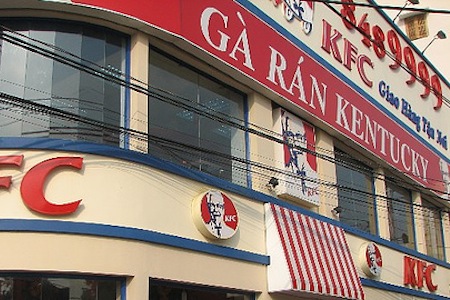Kentucky Fried Globalization

Credit: Wiki Commons.
For anyone who follows the American media's treatment of Asia, coverage of President Bush's recent whirlwind visit to Vietnam was bound to trigger a sense of deja vu. Why? Because the approach reporters took to Hanoi's embrace of capitalism with authoritarian characteristics was so similar to the one they took to Beijing's moves in the same direction when Bill Clinton visited China back in 1998.
What remains to be seen is whether, over time, the American press corps will find a better way of handling the complex cultural dimensions of Vietnam's re-engagement with the West than the approach it took to China's in the 1990s. Will reporters manage to avoid, as some have failed to do so far, two pitfalls that marred treatment of China during Clinton's presidency? First, equating globalization with Americanization. Second, assuming that American products continue to mean exactly the same things as they do at home after they cross the Pacific.
Eight years ago, what might be called the "burgers and bowling" storyline shaped reporting on Clinton's trip. The idea conveyed in words and backed up with photos of Chinese eating Big Macs and shots of billboards for new Beijing bowling alleys, was clear: whatever was happening politically, American ways were transforming cultural life in China's cities.
Fast forward to the present and we find reports on Vietnam that take the same basic approach. McDonald's isn't there yet and bowling hasn't caught on. But stories about the first KFC to open in Hanoi have often read just like reports that appeared whenever a new American fast food chain gained its first foothold in China.
Once again, reporters and broadcasters have played up the irony of an icon of U.S. enterprise being welcomed by a once bitterly anti-American Communist Party. Once again, they have speculated that a wholesale "Americanization," particularly of local youth, is imminent.
It's natural that there should be carryover from 1990s China reporting to coverage of Vietnam today. After all, Hanoi has taken a page from Beijing's post-Tiananmen playbook. The Vietnamese Communists, like their Chinese counterparts, strive to stay in power by limiting political freedoms while increasing the choices that people have about what to consume and how to spend their private time.
One thing that should not be carried over, though, is the burgers-and-bowling approach to cultural change. This approach, with its emphasis on Americanization and its failure to note that even something as generic as a Big Mac can mean very different things depending on the context, should be retired. There are more accurate, and more interesting, ways that the story of an Asian Communist country's re-engagement with the West can be told.
Yes, some Chinese learned how to score strikes and spares in the 1990s, but a far more popular leisure time novelty was karaoke. A more appropriately complex vision of globalization would have been conveyed by stories focusing on that cultural import. It's an activity that has roots in the Philippines and has become associated above all with Japan, but in China involves play lists that include some American songs.
When it comes to generic products taking on localized meanings, the cases of Chinese McDonald's and Starbucks are illustrative. Thomas Friedman of the New York Times insists that a Big Mac is a Big Mac is a Big Mac wherever it's bought and whoever eats it. But UCLA anthropologist Yan Yunxiang has shown convincingly that the same burger means different things in Beijing and in Boston.
In 1990s China, for example, Big Macs were thought of not as meals but snacks (because of their resemblance to pork-filled buns that were never imagined to constitute a main course). And Chinese yuppies (unlike their U.S. counterparts) viewed McDonald's as a good venue for a romantic dinner date.
The arrival of China's first Starbucks six years ago was often told as a simple tale of Americanization. But, again, this was misleading. The management company that oversaw Chinese branches was based in Taiwan, not Seattle, and local guidebooks in Shanghai classified these outlets as "European-style" as opposed to "Japanese-style" cafes.
So if -- or, perhaps more realistically, when -- burgers and bowling alleys follow buckets of The Colonel's chicken to Hanoi, let's hope American reporters learn from past misreadings. It is seductive to contemplate the imminent Americanization of a country governed by a once intensely anti-American regime. But reporters and broadcasters owe it to their readers and viewers to come up with a better way than burgers and bowling to frame this tale of globalization.
Related Links
This piece was distributed for non-exclusive use by the History News Service, an informal syndicate of professional historians who seek to improve the public's understanding of current events by setting these events in their historical contexts. The article may be republished as long as both the author and the History News Service are clearly credited.